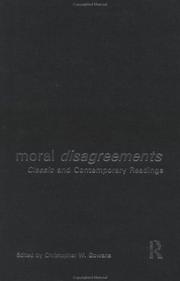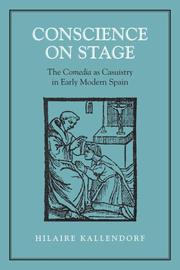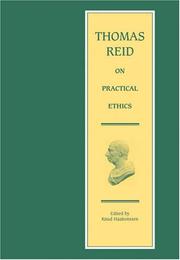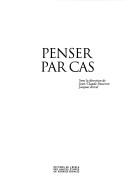| Listing 1 - 10 of 48 | << page >> |
Sort by
|
Book
Year: 2012 Publisher: [Place of publication not identified] : Perlego,
Abstract | Keywords | Export | Availability | Bookmark
 Loading...
Loading...Choose an application
- Reference Manager
- EndNote
- RefWorks (Direct export to RefWorks)
Book
ISBN: 1350006785 1350006777 1350006769 9781350006768 9781350006751 1350006750 Year: 2019 Publisher: London : Bloomsbury Publishing,
Abstract | Keywords | Export | Availability | Bookmark
 Loading...
Loading...Choose an application
- Reference Manager
- EndNote
- RefWorks (Direct export to RefWorks)
"Casuistry, the practice of resolving moral problems by applying a logical framework, has had a much larger historical presence before and since it was given a name in the Renaissance. The contributors to this volume examine a series of case studies to explain how different cultures and religions, past and present, have wrestled with morality's exceptions and margins and the norms with which they break. For example, to what extent have the Islamic and Judaic traditions allowed smoking tobacco or gambling? How did the Spanish colonization of America generate formal justifications for what it claimed? Where were the lines of transgression around food, money-lending, and sex in Ancient Greece and Rome? How have different systems dealt with suicide? Casuistry lives at the heart of such questions, in the tension between norms and exceptions, between what seems forbidden but is not. A Historical Approach to Casuistry does not only examine this tension, but re-frames casuistry as a global phenomenon that has informed ethical and religious traditions for millennia, and that continues to influence our lives today."--Bloomsbury Publishing.
Casuistry --- History, Ancient. --- Middle Ages. --- Judaism. --- Islam. --- History.
Book
ISBN: 1787696014 1787695999 9781787695993 1787696006 1787696022 9781787696013 9781787696006 Year: 2018 Publisher: Bingley
Abstract | Keywords | Export | Availability | Bookmark
 Loading...
Loading...Choose an application
- Reference Manager
- EndNote
- RefWorks (Direct export to RefWorks)
This book brings together the refereed proceedings of the 24th Annual Conference of the Australian Association of Professional and Applied Ethics (AAPAE) 'Applied Ethics in the Fractured State', held at the Institute for Public Policy and Governance, University of Technology Sydney in June 2017. The book is eclectic, with chapters on health regulation in Australia, Eastern ethical theorising (Confucianism; Buddhism), euthanasia and community engagement, all of which are examined from the unique perspective that Research in Ethical Issues in Organizations affords its contributors.
Applied ethics --- Practical ethics --- Ethics --- Casuistry --- Ethical problems --- E-books --- Business & Economics --- Business & management. --- General.
Book
ISBN: 0198822766 0191792845 0191506559 0199683646 1336015535 9780191506550 9781336015531 9780191792847 9780199683642 Year: 2015 Publisher: Oxford
Abstract | Keywords | Export | Availability | Bookmark
 Loading...
Loading...Choose an application
- Reference Manager
- EndNote
- RefWorks (Direct export to RefWorks)
Doing harm seems much harder to justify than merely allowing harm. If a boulder is rushing towards Bob, you may refuse to save Bob's life by driving your car into the path of the boulder if doing so would cost you your own life. You may not push the boulder towards Bob to save your own life. This principle--the Doctrine of Doing and Allowing--requires defence. Does the distinction between doing and allowing fall apart under scrutiny? When lives are at stake, how canit matter whether harm is done or allowed? Drawing on detailed analysis of the distinction between doing and allowing, Fiona Wooll
Responsibility. --- Applied ethics. --- Practical ethics --- Ethics --- Casuistry --- Ethical problems --- Accountability --- Moral responsibility --- Obligation --- Supererogation

ISBN: 0203190688 1134604564 1280328371 0203134435 9780203190685 9780203134436 0415217113 0415217121 9786610328376 6610328374 9780415217118 0415217113 9780415217125 0415217121 9781134604562 9781280328374 9781134604517 9781134604555 1134604556 Year: 2000 Publisher: London New York Routledge
Abstract | Keywords | Export | Availability | Bookmark
 Loading...
Loading...Choose an application
- Reference Manager
- EndNote
- RefWorks (Direct export to RefWorks)
Can moral disagreements be rationally resolved? Can universal human rights be defended in face of moral disagreements? The problem of moral disagreement is one of the central problems in moral thinking. It also provides a stimulating stepping-stone to some of the perennial problems of philosophy, such as relativism, scepticism, and objectivity. Moral Disagreements is the first anthology to bring together classic and contemporary readings on this key topic. Clearly divided into five parts; The Historical Debate; Voices from Anthropology; Challenges to Moral Objectivity; Defenses of Moral Obje
Ethical problems. --- Dilemmas, Ethical --- Dilemmas, Moral --- Ethical dilemmas --- Moral dilemmas --- Problems, Ethical --- Casuistry --- Ethics --- Applied ethics

ISBN: 1442684216 9781442684218 9780802092298 0802092292 Year: 2007 Publisher: Toronto University of Toronto Press
Abstract | Keywords | Export | Availability | Bookmark
 Loading...
Loading...Choose an application
- Reference Manager
- EndNote
- RefWorks (Direct export to RefWorks)
It is no accident that some variation of the question 'What should I do?' appears in over three-quarters of the comedic plays of the Spanish Golden Age. Casuistical dialogue was a concern, even an obsession, of Spanish playwrights during the seventeenth century, many of whom were educated by Jesuit casuists. Conscience on Stage is a study of casuistry or case morality as the foundation for a poetics of seventeenth-century Spanish comedias.Hilaire Kallendorf examines the Jesuit upbringing and casuistical education of major playwrights of the Spanish Golden Age, many of whom were also priests, and introduces the vocabulary of casuistry, as expressed in both confessors' manuals and in stage plays. Engaging issues of class, gender, and age to explore scenes of advice-giving and receiving, she demonstrates how the culture-specific construct of 'conscience' in early modern Spain can be recovered by means of a Foucauldian genealogy, which enlists the skills of philology at the service of a larger vision of the history of ideas. This study outlines and reiterates the relationship of theatre to casuistry, the Jesuit contributions to Spanish literary theory and practice, and the importance of casuistry for the study of early modern subjectivity.
Spanish drama (Comedy) --- Spanish drama --- Christianity in literature. --- Casuistry in literature. --- Casuistry. --- Conscience in literature. --- Confession in literature. --- Confession (Liturgy) --- Penitential celebrations --- Penitential rites --- Cases of conscience --- Christian ethics --- Ethics --- Scholasticism --- Applied ethics --- History and criticism. --- Catholic Church --- History
Book
ISBN: 2821877579 3731501554 1000037755 Year: 2014 Publisher: KIT Scientific Publishing
Abstract | Keywords | Export | Availability | Bookmark
 Loading...
Loading...Choose an application
- Reference Manager
- EndNote
- RefWorks (Direct export to RefWorks)
Im vorliegenden Band "Bereichsethiken im interdisziplinären Dialog" werden u.a. folgende Bereichsethiken bzw. bereichsübergreifende Ethiken behandelt: Technikethik, politische Ethik, Wissenschaftsethik, Nano-Ethik, Wirtschaftsethik, Sicherheitsethik, Ordnungsethik, evolutionäre und experimentelle Ethik, Bioethik, Umweltethik, Tierethik, Sportethik, pädagogische Ethik, Ethik des Neuroenhancement, Medizinethik, Medienethik und Informationsethik.
Applied ethics. --- Interdisciplinary research. --- IDR (Research) --- Research, Interdisciplinary --- Transdisciplinary research --- Research --- Practical ethics --- Ethics --- Casuistry --- Ethical problems --- Bereichsethiken --- Ethik --- interdisziplinär --- angewandte Ethik

ISBN: 0191795259 1281252220 9786611252229 0748630805 9780748630806 0748617094 9780748617098 9780271032290 0271032294 9780191795251 9781281252227 6611252223 Year: 2007 Publisher: University Park, Pa The Pennsylvania State University Press
Abstract | Keywords | Export | Availability | Bookmark
 Loading...
Loading...Choose an application
- Reference Manager
- EndNote
- RefWorks (Direct export to RefWorks)
The pervasiveness of Protestant natural law in the early modern period and its significance in the Scottish Enlightenment have long been recognised. This book reveals that Thomas Reid (1710-1796) - the great contemporary of David Hume and Adam Smith - also worked in this tradition. When Reid succeeded Adam Smith as professor of moral philosophy in Glasgow in 1764, he taught a course covering pneumatology, practical ethics, and politics. This section on practical ethics took its starting point from the system of natural law and rights published by Francis Hutcheson. Knud Haakonssen has reconstr
Applied ethics. --- Practical ethics --- Ethics --- Casuistry --- Ethical problems --- Reid, Thomas, --- Jui-te, Tʻo-ma-ssu, --- Applied ethics --- General ethics --- Reid, Thomas
Book
ISBN: 0585485712 9780585485713 Year: 2002 Publisher: Carbondale : Southern Illinois University Press,
Abstract | Keywords | Export | Availability | Bookmark
 Loading...
Loading...Choose an application
- Reference Manager
- EndNote
- RefWorks (Direct export to RefWorks)
Ethical problems. --- Ethical problems --- Ethics --- Philosophy --- Philosophy & Religion --- Dilemmas, Ethical --- Dilemmas, Moral --- Ethical dilemmas --- Moral dilemmas --- Problems, Ethical --- Casuistry --- Applied ethics

ISSN: 16297121 ISBN: 2713220246 2713231108 9782713220241 Year: 2005 Volume: 4 Publisher: Paris Ecole des hautes études en sciences sociales
Abstract | Keywords | Export | Availability | Bookmark
 Loading...
Loading...Choose an application
- Reference Manager
- EndNote
- RefWorks (Direct export to RefWorks)
Qu’est-ce que penser par cas ? Comment raisonne-t-on à partir de la description de configurations singulières et dans quelle mesure peut‑on prétendre généraliser à partir d’elles ? Le problème n’est pas nouveau. Les casuistiques morales, religieuses, juridiques, la démarche clinique associée à la tradition médicale en sont autant d’exemples attestés dans le long terme. De façons diverses, ces formes anciennes illustrent une voie qui diffère à la fois des déductions formellement nécessaires et de l’expérimentation qui procède par réitération des observations dans des conditions contrôlées. Longtemps délaissée, cette réflexion trouve aujourd’hui sa pertinence. Avec l’usure des grands paradigmes naturalistes ou logicistes, le souci d’une interprétation circonstanciée des singularités a étendu ses effets méthodologiques à la plupart des sciences de l’homme, parfois au-delà d’elles. Il impose d’associer la particularisation des énoncés aux changements de contextes sur lesquels doit statuer la pensée par cas. Il rappelle l’implication réciproque entre l’articulation d’une théorie et la stratégie d’une enquête.
History as a science --- Case-based reasoning --- Case method --- Casuistry --- Raisonnement par cas --- Cas, Méthode des --- Casuistique --- Sciences sociales --- Méthodologie --- Cas, Méthode des --- Cas, Méthode des. --- Casuistique. --- Méthodologie. --- Sciences sociales - Méthodologie --- Acqui 2006 --- Cas, Méthode des. --- Casuistry. --- Méthodologie. --- Methode de cas --- Social sciences --- Paradigms (Social sciences) --- Abduction (Logic)
| Listing 1 - 10 of 48 | << page >> |
Sort by
|

 Search
Search Feedback
Feedback About UniCat
About UniCat  Help
Help News
News